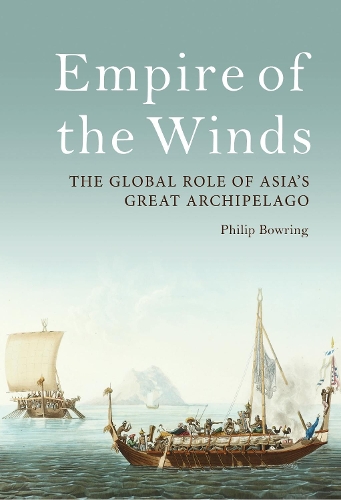
Empire of the Winds: The Global Role of Asias Great Archipelago
(Hardback)
Available Formats
Publishing Details
Empire of the Winds: The Global Role of Asias Great Archipelago
By (Author) Philip Bowring
Bloomsbury Publishing PLC
I.B. Tauris
10th January 2019
United Kingdom
Classifications
General
Non Fiction
Geopolitics
International economics
Economic geography
959.8
Winner of Penang Book Prize 2019 (UK)
Physical Properties
Hardback
336
Width 156mm, Height 228mm, Spine 38mm
760g
Description
Winner of the Penang Book Prize 2019 Nusantaria often referred to as Maritime Southeast Asia is the worlds largest archipelago and has, for centuries, been a vital cultural and trading hub. Nusantara, a Sanskrit, then Malay, word referring to an island realm, is here adapted to become Nusantaria - denoting a slightly wider world but one with a single linguistic, cultural and trading base. Nusantaria encompasses the lands and shores created by the melting of the ice following the last Ice Age. These have long been primarily the domain of the Austronesian-speaking peoples and their seafaring traditions. The surrounding waters have always been uniquely important as a corridor connecting East Asia to India, the Middle East, Europe and Africa. In this book, Philip Bowring provides a history of the worlds largest and most important archipelago and its adjacent coasts. He tells the story of the peoples and lands located at this crucial maritime and cultural crossroads, from its birth following the last Ice Age to today.
Reviews
This fast-paced book by a respected journalist describes how the islands and coastal territories of Southeast Asia have consistently been a crucial element in world history The book is a good corrective to global histories that tend to study the world from a European- or Sino-centered perspective [It] brings forward a lively story about how trade, religion, and culture crossed many boundaries, including oceans, from earliest recorded history, centrally involving the islands and coastal territories of Southeast Asia. Summing Up: Recommended. Upper-division undergraduates through faculty. * CHOICE *
Bowring, in a remarkable display of taut writing, whisks us through the archipelagos geological eruption and mythic floods to the rise and fall of multiple port states and emerging regional dynasties and into the modern era of disruption, decay and dismemberment in less than 300 pages. At the same time, he does a wonderful demolition job on Beijings self-serving take on Asian history. * South China Morning Post *
[Bowring] writes this rich and rambling history as in fact a narrative of change and renewal It is not easy to convince policymakers that history might be the place to look for solutions, yet we have nowhere else to turn to imagine what might yet be possible. * Literary Review *
Beautifully presented with numerous informative maps, excellent illustrations and a very useful glossary, it is both a fascinating read and a very valuable history of one of the worlds most important regions. * Baird Maritime *
A fascinating book ... packed with names, dates and events as Asia's Great Archipelago is packed with islandswell over 30,000 on anyone's count ... An important and timely book ... [For the general reader] who is looking to better understand a complex and pivotal region of the modern world, Empire of the Winds is a must-read. * Journal of the Royal Asiatic Society *
Rich in detail, and laced with vivid anecdotes ... Bowring notes that Nusantaria is just as vulnerable to climate change as it was after the Ice Age ... will the book's excellent maps of Nusantaria have to be drawn again * The Correspondent *
This hardcover book is handsomely produced with a beautiful dust jacket showing fine Nusantarian galleys in the Moluccas, recorded during the Louis de Freycinet expedition of 181720. Its a volume that offers readers a deeper understanding of the vibrant maritime peoples and events that unfolded literally on Australias tropical northern doorstep, to better appreciate the complex development of the human, political and economic region that we inhabit. -- Jeffrey Mellefont * New Mandela *
In contrast and happy opposition to the national frameworks that nowadays limit most historical understandings of the diverse islands and coastlines that make up Southeast Asiaor Nusantaria, as he calls it, Bowring weaves a bright tapestry stretching across the centuries and the oceans to capture our eyes and minds, and remind us of the significance and richness of this often misunderstood corner of the world. * Ooi Kee Beng, Penang Institute (Malaysia) *
Philip Bowring has produced an absorbing and timely history of maritime Southeast Asia. Ranging from prehistoric times to the present, he deftly harnesses an impressive range of sources into a compelling and fast-paced narrative. Bowring has important things to say about how disparate elements of geography, culture, economic relations and political dynamics have shaped a complex region that has long been central to global history. * Gareth Richards, Judge, Penang Book Prize 2019, founder of Gerakbudaya Bookshop Penang and Hikayat *
Author Bio
Philip Bowring is an Asia-based journalist. He was formerly the editor of the Far Eastern Economic Review and has written for the International Herald Tribune, the Wall Street Journal, the Financial Times, the South China Morning Post and the Guardian. He studied at Cambridge University and is an expert on maritime history and the history of Southeast Asia.
